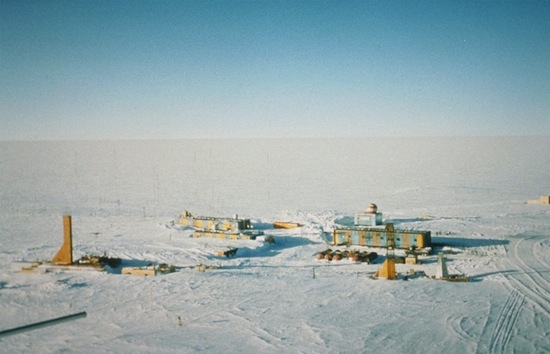First Clean Water Sample Retrieved From Antarctic Lake Sealed by Ice for Eons
After years of failure, a team of Russian researchers and engineers working in Antarctica have succeeded in taking a clean sample of water from Lake Vostok, a liquid water lake sealed beneath two miles of ice sheets at the bottom of the world. Scientists hope that this first untainted sample of the water — which has been largely untouched by the outside world since prehistory — will provide them with new insights into some of Earth’s earliest lifeforms.
Russian scientists and engineers have been working to get a sample from Lake Vostok for years — pretty much, in fact, since it was discovered in 1996 that a geothermal vent was maintaining a the ancient liquid lake beneath miles of ice. Of course, actually getting to the lake proved more trying than anticipated, on account of the aforementioned miles of ice.
After drilling a borehole into the lake, researchers succeeded in pulling up a sample last year, which showed the lake to be devoid of microbial life. That wasn’t enough to send researchers packing, though. After all, the water they retrieved was contaminated by chemicals used during the boring process, though, meaning that it was of limited use to scientists studying the lake and what may live in it. Plus, if you’re already sitting around a hole in Antarctica that you’ve devoted years of your life to drilling, you’re probably going to cast a line into it more than one time, just to be sure you’re not missing anything. Better safe than sorry, right?
Though reports are unclear on exactly how the team has managed to solve its contamination problem this time around, we’re inclined to offer the benefit of the doubt, mostly because we really, really want to see what is living in that lake. With this new, purportedly uncontaminated sample comes hope that new analyses will find previously undiscovered microbial life in the long-undisturbed waters of Lake Vostok, and also that the life won’t be some sort of prehistoric bacterium that sweeps across the globe wiping out all intelligent life. Even if it doesn’t lead to the discovery of new life or its progenitors here on Earth, the work being done at Vostok could help us learn more about drilling for life generally, which could be a boon if we ever set off to ice-covered environments — like Saturn’s moon Titan — in search of alien life.
(via PhysOrg, image courtesy of NOAA)
- Here’s the report from last fall announcing no microbes were detected
- We were so excited when they announced they’d breached the lake
- Titan also has methane lakes that were once thought impossible
Have a tip we should know? tips@themarysue.com
